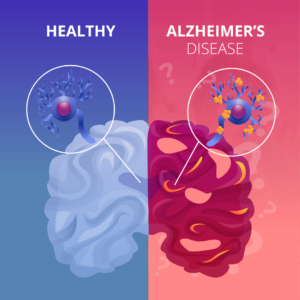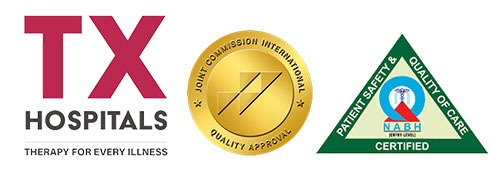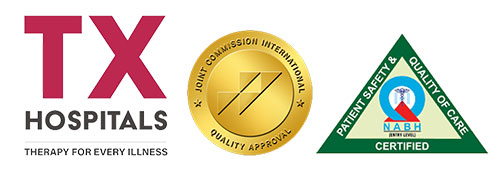Introduction
Alzheimer’s disease is a progressive neurodegenerative disorder that primarily affects the brain, leading to memory loss, cognitive decline, and changes in behavior. It is the most common cause of dementia, a condition characterized by a decline in cognitive function severe enough to interfere with daily activities. Alzheimer’s disease typically develops slowly and worsens over time.

Symptoms
The symptoms of Alzheimer’s disease can vary, but commonly include:
Memory loss: Difficulty remembering recent events, names, or conversations.
Cognitive decline: Challenges with problem-solving, reasoning, and judgment.
Language and communication difficulties: Trouble finding the right words, following conversations, or expressing thoughts.
Confusion and disorientation: Getting lost in familiar places, forgetting the date or time.
Behavioral changes: Mood swings, irritability, agitation, and withdrawal from social activities.
Difficulty with daily tasks: Struggling to perform routine tasks, such as dressing, cooking, or managing finances.
Diagnosis:
Diagnosing Alzheimer’s disease involves a comprehensive evaluation, which may include:
Medical history and cognitive assessments: A detailed discussion of symptoms, medical history, and cognitive tests to assess memory, thinking, and problem-solving skills.
Brain imaging: Imaging techniques such as magnetic resonance imaging (MRI) or positron emission tomography (PET) scans to identify brain abnormalities and rule out other conditions.
Laboratory tests: Blood tests to rule out other potential causes of cognitive decline.
Treatment:
While there is currently no cure for Alzheimer’s disease, treatment focuses on managing symptoms and improving the quality of life. Treatment options may include:
Medications:
Cholinesterase inhibitors: These medications help improve memory and cognitive function in some individuals.
Memantine: It is prescribed to manage moderate to severe Alzheimer’s disease by regulating brain cell activity.
Other medications: Additional medications may be prescribed to manage specific symptoms, such as depression, anxiety, or sleep disturbances.
Supportive therapies:
Cognitive stimulation: Engaging in activities that stimulate thinking and memory, such as puzzles, reading, or music.
Physical exercise: Regular exercise, as approved by a healthcare professional, may help improve cognitive function and overall well-being.
Occupational therapy: Techniques and strategies to assist individuals in performing daily tasks and maintaining independence.
Speech therapy: Assisting with communication difficulties and improving language skills.
Caregiver support:
Caregiver education: Providing information and resources to help caregivers understand and manage the challenges of Alzheimer’s disease.
Support groups: Joining support groups can provide emotional support, share experiences, and provide practical advice.
Lifestyle Changes:
In addition to medical treatment, certain lifestyle changes may help individuals with Alzheimer’s disease:
Healthy diet: Consuming a balanced diet rich in fruits, vegetables, whole grains, lean proteins, and healthy fats, such as omega-3 fatty acids.
Physical exercise: Engaging in regular physical activity, as recommended by a healthcare professional, can help maintain overall health and cognitive function.
Mental stimulation: Engaging in mentally stimulating activities, such as reading, puzzles, or learning new skills, can help keep the mind active.
Social engagement: Maintaining social connections and participating in social activities may help reduce cognitive decline and improve well-being.
Adequate rest: Establishing a regular sleep schedule and ensuring sufficient restful sleep can support cognitive function.
It’s important to consult with healthcare professionals for an accurate diagnosis, personalized treatment plan, and ongoing care for Alzheimer’s disease.







